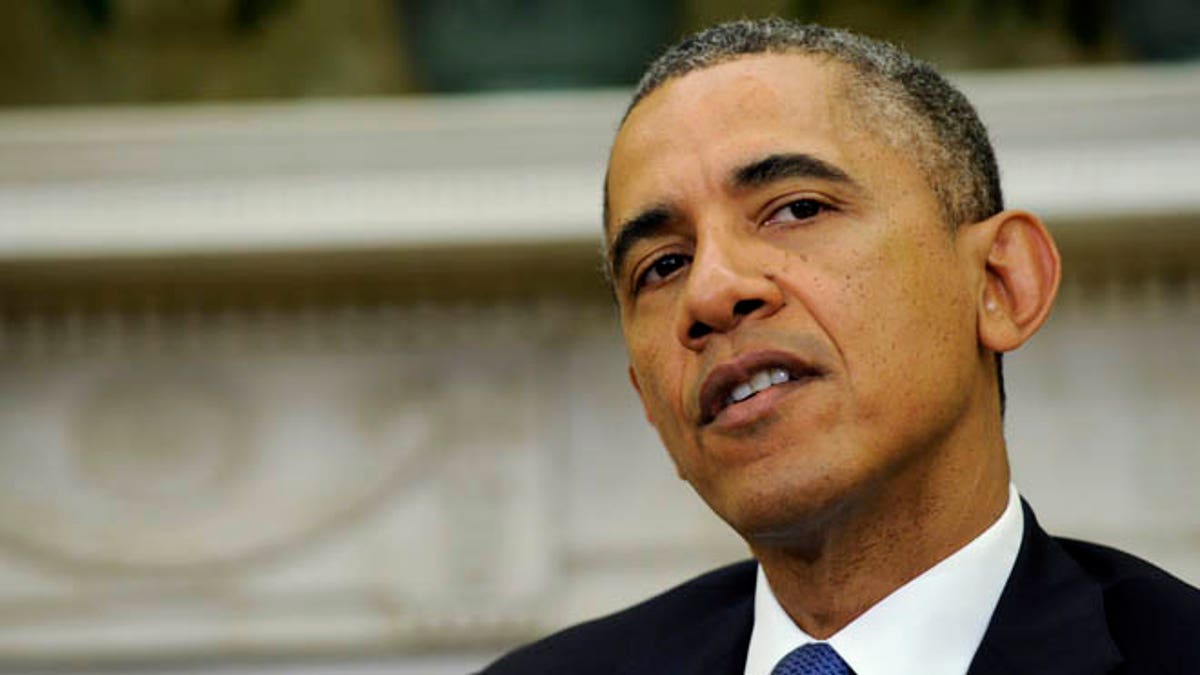
May 12, 2014: President Obama is shown at the White House. (AP)
Editor's note: The following op-ed originally appeared in the Orange County Register. It is used with permission.
The ineffectiveness of President Obama’s foreign policy resembles the record of President Jimmy Carter.
By 1980, American prestige had declined to its lowest point since before World War II. Carter and his two predecessors based their grand strategies on the untenable theory that unilateral American restraint and concessions would induce the Soviet Union to reciprocate. In his May 1977 speech at Notre Dame University, Carter dismissed what he called “our inordinate fear of communism.”
The Soviet invasion of Afghanistan, Moscow’s implacable military buildup, the rise of tyranny and the retreat of freedom demolished Carter’s fantasy of détente.
[pullquote]
Carter’s bungling of the Iranian hostage crisis emblematized the decline of American power.
From Nov. 4, 1979, until Ronald Reagan’s inauguration on Jan. 20, 1981, the revolutionary government of Iran held 52 American hostages. The 444-day hostage crisis invigorated the strength of Ayatollah Ruhollah Khomeini’s Islamist, repressive and virulently anti-American regime while humiliating a hapless Carter administration.
Like the Obama administration fatuously supporting the Muslim Brotherhood in Egypt during the early days of the so-called Arab Spring, the Carter administration completely misread Iran’s revolution. Appallingly, Andrew Young, Carter’s ambassador to the United Nations, called the homicidal and fanatical Ayatollah Khomeini a “saint.”
Despite graduating from the Naval Academy, then serving in the navy as a nuclear engineer, Carter depreciated the utility of military power. Carter largely embraced the overwhelmingly dovish inclinations of the New Politics wing of the Democratic Party associated with Senator George McGovern’s categorical opposition to the Vietnam War.
Carter anguished likewise about the “arrogance of American power.” He used force only rarely, for limited goals, with limited means, and only as last resort.
After months of futile diplomacy yielding nothing but Iranian defiance, Carter ordered Operation Eagle Claw, a military operation to rescue the American hostages. A combination of bad luck, poor planning and Carter’s ambivalence culminated in a catastrophic failure of the mission on April 24, 1980.
Just five of the eight helicopters arrived at the first staging area in operational condition, not even the bare minimum for a remote chance of success. The adminstration settled on eight initially as a compromise between National Security Director Zbigniew Brzezinski’s staunch advocacy of the mission and Secretary of State Cyrus Vance’s categorical opposition.
When three of the helicopters experienced mechanical difficulty, President Carter aborted the mission on the commander’s recommendation. Eight men died during the evacuation when an American transported plane collided with a helicopter. An oblivious Carter pronounced this debacle in the desert “an incomplete success.”
Yet Carter radiates vigilance compared to Obama. Obama’s deep aversion to force arises from what he dubiously considers “the disastrous decision to going into Iraq.”
President Obama gave a full-throated defense of his policy of retrenchment and non-confrontation at a recent press conference in Manila despite growing apprehension about China’s belligerence, Syria’s ongoing atrocities against its own population amidst a raging civil war, Iran’s push to cross the nuclear threshold and Russia’s rampant subversion of Ukraine’s independence. “Why is it that everybody is so eager to use military force after we’ve just gone through a decade of war?” Obama ridiculed his hawkish critics.
As Russia undertakes what Canada’s Prime Minister Stephen Harper describes as “slow-motion” invasion of Ukraine, Obama continues to prevaricate. He has held the imposition of serious sanctions on Russia hostage to the unlikely prospect of achieving a consensus among a G-7 predisposed to appease or do nothing, absent decisive American leadership to rouse it.
President Obama also has reprised Carter’s mistake of offering too little, too late credibly to reassure Eastern European allies terrified of becoming Putin’s next target.
In 1980, Carter boosted defense spending, significantly hoping to blunt the withering critique of his successful challenger Ronald Reagan, who preached and practiced peace through strength.
Conversely, Obama shows no signs of relenting on his determination to diminish American power regardless of the consequences.
Count on worse to come until Americans elect a neo-Reaganite president who will renounce the Carteresque foreign policy of Barack Obama.
